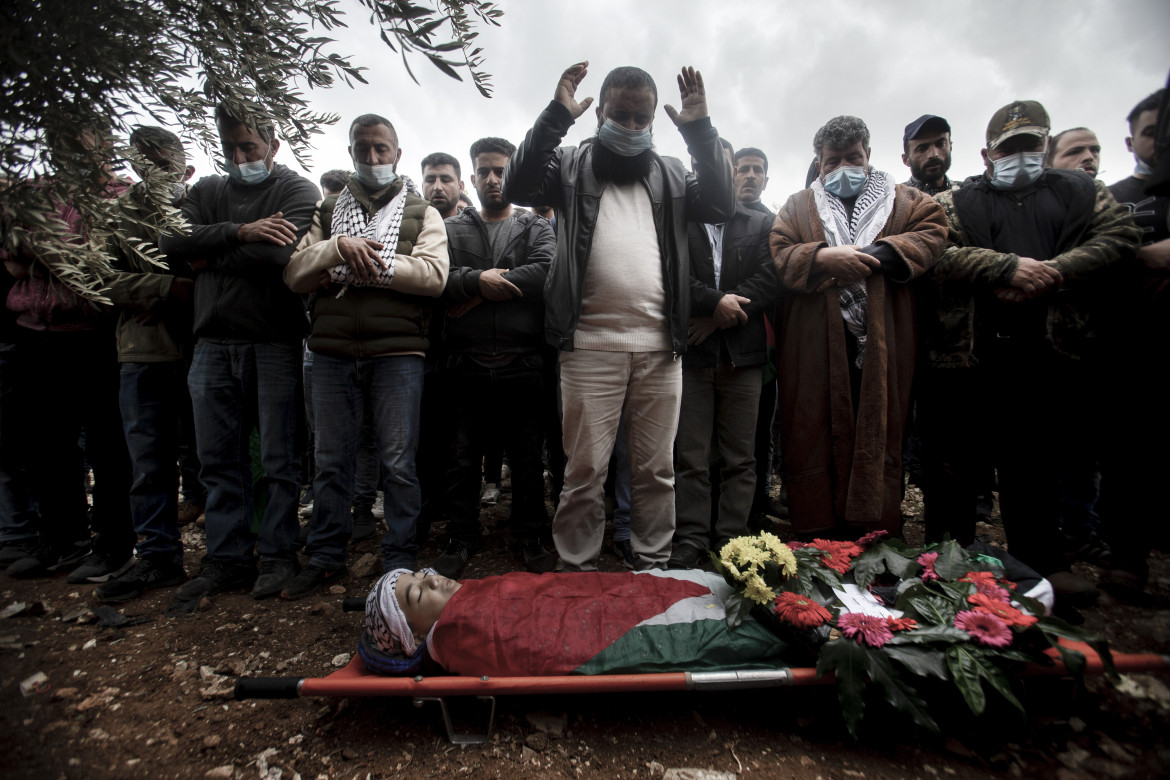Reportage
Isolated, alone and humiliated: Palestinian minors interrogated in Israeli prisons
As Palestinians bury another child, killed by Israeli soldiers, a Defence for Children International report denounces the conditions under which Palestinian minors arrested by Israel are held in detention and interrogation.

A birthday that turned into a funeral.
“Ali went out into the street with me. Israeli soldiers were shooting rifles and throwing tear gas, but we were thinking about the birthday cake his mother was making. Then, Ali collapsed on the ground, holding his belly, and lost consciousness,” recounted Muhammad Abu Aliya, 16 years old, to journalists on Sunday about the last living moments of his cousin and friend Ali Abu Aliya. He was killed on his 14th birthday by a bullet fired by Israeli soldiers, which tore his intestine apart.
“He didn’t stand a chance, the internal bleeding was devastating,” explained the doctors at Ramallah hospital who tried to save the boy to no avail.
The bullet was one of those that the Israeli army denies having fired at demonstrators in the Palestinian village of Al Maghayer, east of Ramallah, who have long been fighting against a Jewish colonial outpost. The spokesman of the military claims that the protesters were dispersed with tear gas, rubber bullets and using small-caliber Ruger rifles, which are not supposed to be lethal. These, however, are certainly no pellet guns, especially when fired at close range. As the human rights NGO B’Tselem explains, Ruger rifles have killed at least seven demonstrators since 2015.
In any case, the Palestinians are flat-out denying the Israeli version, according to which the soldiers responded to an intense barrage of stones. The villagers are accusing that the soldiers fired immediately at human height and threw dozens of tear gas canisters.
In Al Maghayer on Sunday, heedless of the second wave of coronavirus that is causing so many victims in the West Bank, hundreds followed in the procession behind Ali’s body, wrapped in the national flag, covered with flowers, carried on their shoulders by friends and family. On the side, at a distance, his mother Rawan was also there together with other women, in endless tears. “Ali loved soccer. At our home you can find balls and shirts from international clubs everywhere. He dreamed of becoming a champion,” said Ayman, the boy’s father. Two years ago, Ali had been lightly wounded by a rubber bullet during the clashes with the army following the killing of another young boy from the village, Laith Abu Ali.
There is a lot of pain, but also anger. The Palestinian National Authority of Mahmoud Abbas called it a “war crime.” The spokesperson of the Fatah movement, Osama al-Qawasmi, urged the Palestinians to respond to these killings by strengthening national unity. The same exhortation was made by the Islamic movement Hamas, which called for “a return to national consensus to resist the occupation.” And the European Union, through its local representative, called for an investigation into the incident. “Children enjoy special protection under international law,” underlined the EU delegation. “How many more Palestinian children will be subject to the excessive use of lethal force by the Israeli security forces?” It added that this “shocking incident must be swiftly and fully investigated by the Israeli authorities in order to bring the perpetrators to justice.”
The killing of Ali Abu Aliya comes as the attention of human rights and children’s defense centers once again focuses on Palestinian children and young people under military occupation. In a 73-page report, “Isolated and Alone: Palestinian children held in solitary confinement by Israeli authorities for interrogation,” the NGO Defence for Children International-Palestine denounces that the Israeli authorities are holding Palestinian children in solitary confinement during the interrogation, which can last up to several days, and urges that this practice be considered a form of torture: “International law prohibits the use of solitary confinement and similar measures constituting cruel, inhuman or degrading treatment against children, and yet Israeli authorities frequently detain children in this manner,” recalled Khaled Quzmar, the director of DCIP. “It is widely acknowledged that this practice causes both immediate and long-term psychological harm to children.”
While they are in solitary confinement, DCIP writes in the report, the detained children have no meaningful human contact, since interactions with others are often exclusively with those who are interrogating them. Meals are passed through an opening in the cell door. Some of the young detainees report that the isolation cells are poorly ventilated, the lighting is on 24 hours a day and there are no windows. DCIP adds that during the interrogations, Israeli military law does not guarantee Palestinian minors the right to the presence of a parent or lawyer.
The techniques used are coercive, a combination of intimidation, threats, verbal abuse and physical violence with the clear aim of obtaining a confession. From January 1, 2016 to December 31, 2019, 108 minors were held in isolation, in some cases for two weeks.
According to the research carried out by the NGO, Israel prosecutes between 500 and 700 children each year in military courts. It is estimated that since 2000, the Israeli authorities have detained, interrogated, prosecuted and imprisoned an estimated 13,000 Palestinian children. At the moment, 15 Palestinian minors are in solitary confinement and 168 are imprisoned for security reasons.
In recent days, the Israeli newspaper Yediot Ahronot has also written about these abuses. It found that between 2017 and 2019, the military forces in the West Bank and East Jerusalem arrested 5,000 Palestinian children between 12 and 18 years of age, applying detention methods similar to those used in the arrest of adult suspects. They were blindfolded and handcuffed, and many of them reported being hit in the back with rifle stocks. Others report being interrogated throughout the night, non-stop. Israeli civil law protects arrested minors. However, unlike Israeli children, Palestinian boys in the West Bank are tried by the military and enjoy little protection.
Originally published at https://ilmanifesto.it/isolati-soli-e-umiliati-i-minori-palestinesi-interrogati-nelle-carceri-israeliane/ on 2020-12-06
